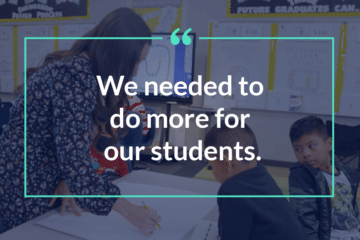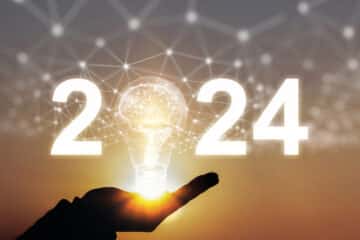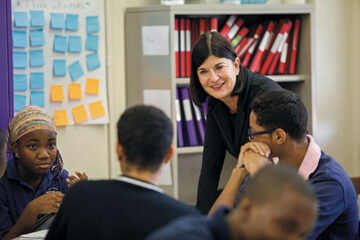Cross-posted at Education Week.
My last blog was a brief summary of a paper commissioned by the Government of New South Wales, Australia for use as part of a symposium on Education for a Changing World. In it, I described how artificial intelligence, automation, robotics, natural language processing, neural networks and related disciplines have been evolving in recent years and the implications for work, jobs, income distribution, and, indeed, what it means to be human.
In this blog, I explore the implications for what young people might need to know and be able to do to cope with the world I described in the last blog and perhaps flourish in it. In particular, I offer some ideas about the kinds of experiences young people might need as they grow up in this new world. This blog is a summary of the second paper I prepared for the Education For a Changing World symposium, which you can find here.
We begin with a sketch of the present and near future described in the last blog. It is a brave new world in which at least half of the existing jobs in the advanced industrial countries can be automated with machines that are currently available. These are the jobs of drivers, retail clerks, miners, farm workers, manufacturing workers and warehouse workers, among many others.
Most of the jobs that will be wiped out first are the jobs requiring the skills needed for routine work. These are the jobs that can be done by people who have only 7th or 8th grade levels of literacy—about half of our high school graduates. Which is to say that fully half of our high school graduates are qualified only for jobs that will be among the first to be done by machines more reliably and increasingly cheaper than by humans.
But the jobs that can be done by intelligent machines today or in the very near future are not limited to those requiring only routine skills and low levels of literacy. Many high skill jobs are also on the chopping block. There are now artificial intelligence programs that can write artificial intelligence programs. Some of the world’s biggest investment banks are ditching their human investment bankers for software that can make investment decisions at least as good as those made by human investment bankers. Music critics cannot distinguish between music—both symphonic and pop—written by intelligent machines and human composers.
The most endangered species? Regular full time jobs. It now appears that all of the net new jobs added since the Great Recession can be accounted for by people who have been added to the ‘gig economy.’ These are people, often professionals, who work for multiple employers, often doing different kinds of work for different employers, with no job security and no benefits.
That’s how it is now, on the cusp of the future. What comes next? As I pointed out in my last blog, some see utopia—machines do all the work, everyone lives to be 150 or perhaps forever and they live that life in the lap of luxury—and others see dystopia—a handful of fabulously rich people, supported by a band of artists and professionals who do very well for themselves; the rest, declared ‘surplus labor,’ survive on the dole. The first seems at best a distant dream. The second option is well underway.
Seeing this emerging picture, educators could prepare to sort our young people into two bins, a small one big enough for the super rich, their professional retainers and their children, who would need or would be in a position to demand a fine education, and all the rest, who, as ‘surplus labor’ live on the dole, who would need and could afford, very little education. But that would be patently unethical. And it wouldn’t work anyway. As humans, we derive much of our dignity and sense of self-worth from the contribution we make through our work. To accept the idea of ‘universal basic income” (aka welfare) is to accept permanent political upheaval or the steady advance of autocracy and the end of democracy.
In my view, the utopian vision is naïve at best and the dystopian vision is all too possible but avoidable. We should aim for a society in which all are employed at serious work that improves the human condition, leads to broadly shared prosperity, and provides ample work that needs to be done for everyone who wants it as well as the dignity that goes with that work.
But, given the environment in which those goals will or will not play out, education and schooling—not the same thing—may well spell the difference between utopia and dystopian outcomes. Here is how I see the kind of education we will need in the years ahead.
In a world in which routine work will be done by machines, the work of humans will involve increasing technical complexity. But your employer will not teach you how to do that work. In a ‘gig economy’ in which fewer and fewer workers will be full time regular employees, employers will have little incentive to invest in their workers; people will have to come from initial education fully equipped to do highly complex technical work. But, in a gig economy in which more and more workers will have to be able to do a swiftly changing array of jobs, not in succession, but all at once, they will have to be very broadly and deeply educated, so they can learn very quickly.
“Deep conceptual mastery of the disciplines, constantly applied to the unexpected” will be the watchword.
This will require a “T-Shaped” curriculum, the bar at the top being a first-rate liberal arts curriculum, and the vertical element an equally first-rate preparation for hitting the ground running with a complex technical specialty; they will have to be intertwined.
In a world in which the machines will be doing a lot of the thinking, humans will have to be exceptionally good at the quintessentially human: empathy, warmth, courage, caring, sensitivity, managing, and supporting. These can be taught but only in action and by example.
In a world in which information is ubiquitous and cheap, schooling will have to be not so much about “stuffing the duck” with information as creating experiences, in and out of the classroom and in and out of school, that will combine to give students the qualities demanded by this new environment.
In a world in which amoral machines will be making momentous decisions, schooling will have to pay much more attention to the moral dimensions of education and to the values that will help shape people’s interactions with the new machines and each other.
In a world in which machines could in relatively short order destroy the jobs of millions of people and, in the process of doing so, destroy democracy and liberty, it will be more important than ever for future citizens to understand the historical forces that produced democracy, how important it is, how fragile it is and what it takes to sustain it.
In a world in which job destruction will reach those in the lower half of the income and skill distribution first, it is essential that nations redesign their education systems to provide to all students the kind of education they have heretofore provided only to their elites.
In a world in which the jobs available to people with 7th or 8th grade levels of literacy are disappearing, educators can no longer think of vocational school as the place that students who cannot do academics go. All students, whether they are going to work right after school or later, will have to have a high level of academic skill.
In a world in which all education is about learning to learn, and about learning how to apply what you learn to a swiftly changing array of unexpected real world problems, all education will be a mixture of formal learning and applying that learning in real time to real, unanticipated problems. Academic learning will need to be more applied. Vocational learning will need to include more theory. Everyone will be going back to school all the time, but most people will stay on the job while they are learning.
Education has never been more important. It could make the difference between a world in which humans become pets to amoral, but extremely powerful machines and a world in which the same machines enable humans to create a world we could otherwise have only dreamed of.





